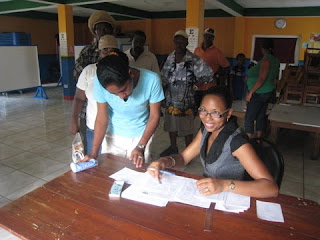A local church (‘The Church of the Nazarene’ based in Kingstown) took on the task of organising a free optometry clinic for me to provide services in during the week that I was in Saint Vincent. I had befriended the pastor of the local church while in Dunedin last year (he was my fellow striker in the football team we both played in); He was in New Zealand with his wife who is completing a PhD with the University of Otago. She is on study leave from her position with the St Vincent Government and did an excellent job of sorting out the legalities of the free clinic with the Ministry of Health, and liaising with the other various organisations that offered assistance to us. She is a very capable and compassionate individual, and a key member in our team.
This was the first time the church had organised such a clinic and they did a great job. I was working out of a large room in the church hall. It was very hot (and noisy at times) but well set out for the patients who chose to wait up to three hours for their turn to been seen. Members of the church were also employed to help set up and staff the clinic. I trained a number of people to measure vision and take basic patient details. These people were also charged with keeping the peace and the numbering system in place in the rather warm waiting room.
We had a few issues organising the equipment I needed (I only travelling with a few cross cylinders and a ret rack). The local hospital was not willing to provide all the instruments on the list I provided them with. The strangest denial from the hospital was in response to the hand held tonometer, which they said was too new to be used. Dr Onu (pictured standing beside me in photographs below), one of the local ophthalmologists was kind enough to supplement the equipment I received from the hospital with equipment from his private practice. In the end, most of the equipment I used belonged to him. Dr Onu also generously offered to see all the patients that I wanted to refer for ophthalmological care. He is seeing them in his own practice at no cost to the patients. We are very grateful to Dr Onu, without his assistance the week long clinic would not have had half the success it did.
The patients were drawn from the poorer neighbourhoods in Kingstown which surround the local church. Church members went out into the community to invite them to attend the clinic in the coming week, where they could have their eyes tested and glasses provided for free.
I managed to see a little over 150 patients during the four days of consultations. I used an abbreviated examination (obviously) which majored on refraction without ignoring the need to screen all the patients for ocular disease. A good cross section of people turned out: I saw women and men, boys and girls, of all ages. I referred about 20 patients to Dr Onu - mostly for bilateral cataracts & full glaucoma work ups - the remainder were for diabetic retinopathy, red eye problems, and other miscellaneous conditions. It was my first time working with a portable hand-held slit lamp. It was very useful for investigating the anterior eye complaints such as itching and tearing (which came up a lot). It also allowed me to diagnose a case of post-surgical posterior capsule opacification that I was able to refer on for a spot of YAG laser.
The local Lions Club had kindly offered to fill the prescriptions I was generating. It was not until half way through the week that we learned that the way they intended to fill the prescriptions was to allow us to fossick through the large old collection of donated spectacles (the bane of the aid optometrist’s working life!) they had stored in their premises. As such, a long hot night was spent at the end of the working week searching through box after box of old crusty spectacles, looking for what we were looking for. We managed to match 70 prescriptions to donated spectacles (which was a mighty fine effort given the poor quality of most of the frames & lenses, and the poor labelling system used for the boxes). A number of ready made spectacles were ordered for the people who could be suitably corrected by them. The local Rotary Club is also willing to pay for the 17 prescriptions that could not be matched with a donated pair of spectacles, or filled with a pair of ready made glasses, to be made up as brand new glasses. All together, 120 pairs of glasses were issued free of charge to those who had need of them.
In terms of ongoing optometrical care in St Vincent, there are two qualified optometrists in Kingstown (population 30 000), one of which is nearing retirement. The local ophthalmologists also do a lot of refracting. Dr Onu sells frames and has a lab attached to his practice. (I am assured that the professions of ophthalmology and optometry exist in harmony in St Vincent.) Dr Onu is looking for an optometrist to work in his practice, (I have put him in contact with the School of Optometry in the West Bank who have just graduated their second class, most of whom do not have jobs to go into). Dr Onu is also looking into the possibility of having the ophthalmologists who are being trained in Caribbean region to use the new optometry school in Guyana (where I will soon be assisting the teaching staff) to learn to refract.





